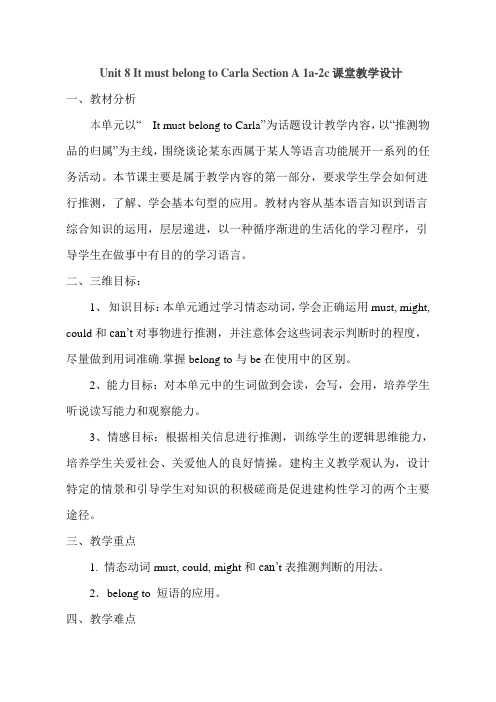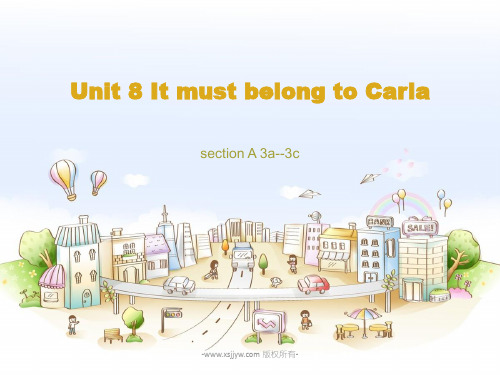新目标九上学案---Unit 8
- 格式:doc
- 大小:75.00 KB
- 文档页数:3


Unit 8 It must belong to Carla Section A 1a-2c课堂教学设计一、教材分析本单元以“ It must belong to Carla”为话题设计教学内容,以“推测物品的归属”为主线,围绕谈论某东西属于某人等语言功能展开一系列的任务活动。
本节课主要是属于教学内容的第一部分,要求学生学会如何进行推测,了解、学会基本句型的应用。
教材内容从基本语言知识到语言综合知识的运用,层层递进,以一种循序渐进的生活化的学习程序,引导学生在做事中有目的的学习语言。
二、三维目标:1、知识目标:本单元通过学习情态动词,学会正确运用must, might, could和can’t对事物进行推测,并注意体会这些词表示判断时的程度,尽量做到用词准确.掌握belong to与be在使用中的区别。
2、能力目标:对本单元中的生词做到会读,会写,会用,培养学生听说读写能力和观察能力。
3、情感目标:根据相关信息进行推测,训练学生的逻辑思维能力,培养学生关爱社会、关爱他人的良好情操。
建构主义教学观认为,设计特定的情景和引导学生对知识的积极磋商是促进建构性学习的两个主要途径。
三、教学重点1. 情态动词must, could, might和can’t表推测判断的用法。
2.belong to 短语的应用。
四、教学难点1、情态动词must, could, might和can’t表推测判断的用法。
2、belong to sb 与be sb’s的区别。
五、教学策略:归纳总结情态动词can, may, must, could ,might表推断的用法,比较它们的用法区别。
在选择它们进行运用时,要多角度,全方位地思考,根据句子语境明确句子的含义,选择正确的情态动词。
六、教学准备:PPT,优盘,一些学习用品,学案,书包,翻页笔七、学生课前或课外活动设计:1.学生课前听一首英语歌,让其尽快进入学习英语的状态。
2.让学生准备好自己的书包以及学习用品,当作课堂练习对话的道具。




英语九年级上册第八单元导学案执笔人李小娜Section A(共2课时)一、课前预习词汇:查出下列单词的中文意思,并抄写五遍。
hunger()cheer()advertisement()establish()major()commitment()elementary()veterinarian()coach()二、重点讲解及课堂练习c lean up 打扫,收拾干净cheer up (使)高兴起来,使。
精神起来give out 分发,散发put up 张贴,挂起;建起,举起put off 推迟,延期set up 建立,组建come up with 想出,跟上not only…but also… 不但…而且…,主要用来连接两个并列成分,也可以连接两个分句。
not only…but also…连接主语时,其谓语动词的单复数依照“就近原则”确定。
如:Not only you but also Tom is fifteen years old. 连接两个分句时,为了加强语气,可将not only放在前一分句主语之前,这时,主谓应用到装形式。
如:Not only has he been to Beijing but also he has been to Shanghai.sth. takes sb. some time某事花费某人(多长)时间It takes sb.some time to do sth. 做某事花费某人(多长)时间It’ll take you about an hour to write the composition.堂上练习()1. He felt so that he ate three bowls of noodles.A. hungryB. hungerC. hungrilyD. full()2. He sings for groups of people at the city hospital to them .A. set; upB. clean; upC. cheer; upD. put; up()3. Keep quiet ! I'll the examination papers.A. give upB. give outC. give inD. give down()4. Never till tomorrow what you can do today.A. put offB. take offC. be offD. take down()5. He couldn't an answer when I asked him why he was late.A. come overB. catch up withC. come outD. come up with( )6. Your bedroom is too dirty, please __A. clean up itB. clean it upC. clean in itD. clean it in( )7. __ of the two boys got a new English book at the beginning of this term.A. EveryB. AllC. EachD. None( )8. They all the sports meeting yesterday.A. joinedB. attendedC. took part inD. to join( )9. Joy spent two hours __ her aunt.A. to write toB. write toC. writing downD. writing to( )10.--Didn't you give roses to your father on Father's Day?--Oh, not only my father, my grandpa got red roses.A. orB. andC. but alsoD. until家庭作业( )1. My mother always tells me out alone at night.A. goB. not goC. not to goD. don' t go( )2. You are so busy, what do you want me for you?A. doB. doneC. to doD. doing( )3. My father will an important meeting next week.A. joinB. take part inC. join inD. attend( )4.The song made my father his childhood.A. think overB. thinks aboutC. to think ofD. think of( )5.If you still have any other questions, please __ your hand.A. put offB. put downC. put onD. put up( )6.The book is useful to me, so I have to __ 20 yuan it.A. spend; toB. take; onC. pay; forD. cost; on( )7.You can' t put off __ your homework.A. doingB. doC. didD. to do( )8. Can you help me the living room?A. cheer upB. give upC. fix upD. clean up( )9.He puts his love good use working in a hospital,A. on; byB. at; onC. to; byD. to; about( )10. you but also he to attend the meeting.A. Not only; hasB. Not just haveC. Not also; hasD. Not with; have( )11.At last the inventor an idea.A. come up withB. came trueC. pointed toD. opened to( )12.Although he was a child, he tried to find ways __ people life more.A. to help; enjoyB. help; enjoyC. to help; enjoyingD. help; enjoying( )13.He looks sad. Let' s .A. cheer up himB. laugh at himC. cheer him upD. take after himSection B(共2课时)一.课前预习1.词汇查出下列单词的中文意思,并抄写五遍。
Unit 8 It must belong to Carla.Section A 1a-2dBy Liu Yaxin Xinhu Middle School, Dong PingGood morning everyone . I’m glad to see you and I’m glad to have this class today . This lesson will take a competetion between the boy and girls. Take a look at who will win the final victory. OK. Now, let’s learn the new lesson Unit 8 . Read the title with me . Unit 8 It must belong to Carla.Step 1 ObjectivesExplain them to the students.Step 2 New words and phrases1.Look for the students to read., See how the students prepair for preview.2.Read after some students.3.Stand up and see who spell better.Step 3 Lead-inLook at the photo in my hand . Whose photo is it ? Ask some students to guess. It could /might be ----- What words should be used when you are guessing. Now look at the things in the pictures that belong to .Step 4 Situation learning1.learn the new sentences and explain could /might/can’t/must.2.Practice the sentences.For example : Whose volleyball?It must be Feng Kun’s.? It must belong to Feng Kun.Step 5 Game (Challenge your memory)1.Look at the smile faces of the famous people and look closely at what they look like.2.Guess who the cats belong to.Step 6 Listening practice1. Listen 1b carefully. Listen and match each person with a thing and a reason.2.Pair work Use these things to practice in pairs.Step 7 Game1.Guessing gameSee who can guess better.(Boys and girls Are you ready?)2.Challenge your intelligenceLook at the two pictures carefully.Can you guess what they are ?Step 8 Summary1.See what the three words mean: must could/might can’t2.It can’t bemight/could be +adj./n./doing/sb’smust be3.Important sentences.Step 9 Listening practice1.2a Listen and write down the things in the schoolbag.2.2b Listen again. Fill in the blanks.Step 10 Conversation 2d1.Listen and underline the phrases.Then translate into Chinese.2.Read the conversation and answer the questions.(1)Whose schoolbag is lose ?(2)What’s in the schoolbag?(3)Where did she go yesterday?3.Read and close your books.Fill in the blanks.Step 11 Test1.Fill in the blanks with must be might/could can’t must belong to2.Choose the best answers.3.Translate and write down.Step 12 HomeworkMake sentences about inference with “must, might, could, may, can’t ”.。
Unit 8 It must belong to Carla一短语1.belong to属于 2.the rest 其余 3.pick up捡起;拾起 4.each other 彼此;相互5.anything else 别的东西6.run away走开;跑开7.feel uneasy 感到不安8.have no idea不知道9.I guess so 我想是的10.run after追赶;追逐11.catch a bus 赶公交车12.at the same time同时;一起13.point out指出;指明14.in a certain way以一种特定的方式15.prevent illness 防治疾病16.stop...from doing sth阻止...做某事17.right now此刻;现在复习used to do sth 过去常常做某事have fun doing sth 做某事很开心too...to..太...而不能... not only...but also...不但...而且... communicate with sb 跟某人交流some...others...一些...一些... 本单元的习惯用法1.nothing much没有什么事;2.不定代词+adj3.see/hear sb doing sth 看见/听见某人正在做某事4.hope to do sth 希望做某事5.have fun doing sth 很开心地做某事6.one of the 最高级+名词(复数): 最...之一7.keep sb adj 让某人保持...二考点与重点讲解1.It must belong to Carla 复习belong to 的用法Such as the importance of money and success, but not about belonging to a group(八下--Unit 8--p62--2b) belong to: "属于" . to是介词. belong to是动词短语.belong to后面只能加名词或人称代词的宾格,不能加名词性物主代词或名词的所有格用法: ⑴belong to+ 名词/代词(必须人称代词的宾格形式)eg: ①This cell phone belongs to me. 这个手机是我的。
②That bike doesn't belong to Jack. 那辆自行车不是杰克的.⑵ belong to 没有现在进行时和被动语态eg:①这条裙子不是张芳的(√)This skirt doesn't belong to Zhang Fang. (×)This skirt isn't belon ging to Zhang Fang.②这个商店属于我们学校.(√)This shop belongs to our school. (×)This shop isn't belonged to our school.⑶belong to常与物主代词/名词的所有格进行句型替换。
sth belong to sb= sth be one'seg: ①These books belong to me.=These books are mine.这些书属于我的。
②This book belongs to our teacher=This book is our teacher's 这本书是我们老师的2.I attended a concert yesterday so it might still be in the music hall.attend v “出席参加”其宾语通常是meeting,party,show,wedding,class,lecture,school,church.eg:Did you attend the meeting yesterday?拓展: attend,take part in; join 与join in.attend: 一般是参加会议,出席典礼或招待会,也可以是指上学/听课/听演讲或讲座take part in: 指参加某活动并参与到活动中来join:指加入某个组织并成为其中的一员join in 指参加某项活动3.I think somebody must have picked it up. pick up的用法pick up: “拾起,拿起,捡起”为“动词+副词”构成的动副短语.人称代词做宾语时,一定要放在中间.eg: There are some keys on the road. Please pick them up.4.Nothing much ever happened around here.happen 与take place的用法: happen 与take place "发生"都是不及物动词,不能带宾语.⑴happen:"(偶然)发生" 强调偶然性. 主语一般是what,it,accident, this, that, sth,anything 等词.常用句型⑴...happen to sb /sth(事情)发生在...身上⑵happen to do sth碰巧做谋事⑵take place: "发生"指经过事先安排的事情发生,指有计划的发生.主语常是"运动,活动,会议"等eg: The Olmpic Games take place every four years 奥林匹克运动会每四年举行一次5.Every night we hear strange noises outside our window.noise,voice,sound的用法⑴noise:/U/ /C/“噪音,吵闹声,嘈杂声”指人们不愿意听到的声音。
⑵voice:/U/ /C/ “声音”指人说话或唱歌时发出的声音,也指鸟鸣声、乐器声,侧重于悦耳之声。
⑶sound:/U/ /C/ “声音” 泛指人们用耳朵能听到的各种声音。
eg: ①There is too much noise in the room.隔壁的房间里有点太吵。
②I heard some strange noises in the next room.我听到隔壁的房间里有一些奇怪的声音。
③She has a sweet voice.她有悦耳动听的嗓音。
④Sound travels more slowly than light.声音比光传播得慢。
6.but I couldn’t see a dog or anything else, either.(1)else 与other(别的,其他的)else: adj, adv用来修饰不定代词、疑问词、或者副词。
修饰这些词时,else要放在后面,作定语。
other: adj用来修饰名词或代词,通常放在其前,作定语。
eg: ①What other things did he tell you? 他还告诉你别的什么事情?②Do you have anything else to say? 你还有别的事情要说吗?③Where else did you go last summer?去年夏天你还去别的什么地方?(2)as well,too,also,either得用法①as well“也”口语句末肯定句,疑问句不用逗号分开②too “也”口语句末肯定句,疑问句用逗号分开③also“也”正式用法句中(动前be助后) 肯定句④either“也”句末否定句用逗号分开eg:①He is also a doctor= He is a doctor, too = He is a doctor as well 他也是个医生②He isn't a doctor ,either 他也不是个医生7.There must be something visiting the homes in our neighborhood...There be sb/sth doing sth 有某人/某物正在干某事eg: look ! There is a cat climbing a tall tree over there. 看!那边有一只猫正在爬一棵高树.8.The nose-maker is having too much fun creating fear in the neighborhood.复习(1) have fun (in) doing sth意为“很开心做某事”in 可以省略。
We had fun playing computer games.(2) fear /U/“恐惧惧怕害怕;担忧”。
There is no reason for her mother’s fear.9.Whenever I try to read this book, I feel sleepy.sleep,sleepy,asleep 和sleeping的用法⑴sleep: n v "睡觉" eg:①He had a good sleep. ②Last night, I slept very well.⑵asleep:adj "睡着的" 常作表语,不作定语常用短语:①fall asleep 入睡②be asleep: 睡着③fast/sound asleep 睡的很香/熟⑶sleepy: "想睡的,困倦的" 可作表语和定语eg: I feel sleepy today 今天我感到困倦⑷sleeping:"睡着的"作表语和前置定语, 也可作动名词表作用.eg: a sleeping boy 一个睡着的男孩 a sleeping car 卧铺车厢10.He might be running to catch a bus.Ⅰ.could/may/might/must be+doing:表示对现在正在进行动作进行推测. "可能/也许/一定在做某事".eg:He might be sleeping at home now. 他现在可能在家里睡觉呢.Ⅱ.catch a bus: 赶班车=take a bus.eg: Please hurry up, or we can't catch the first bus.请快点,否则赶不上早班车了.11.not only...but also... "不但...而且...."是一个并列连词,用来连接两个并列成分.强调的重点在后面.⑴连接主语: 连接并列主语时,谓语动词要“就近一致”e g:Not only he but also I am good at English不仅他而且我也擅长英语。